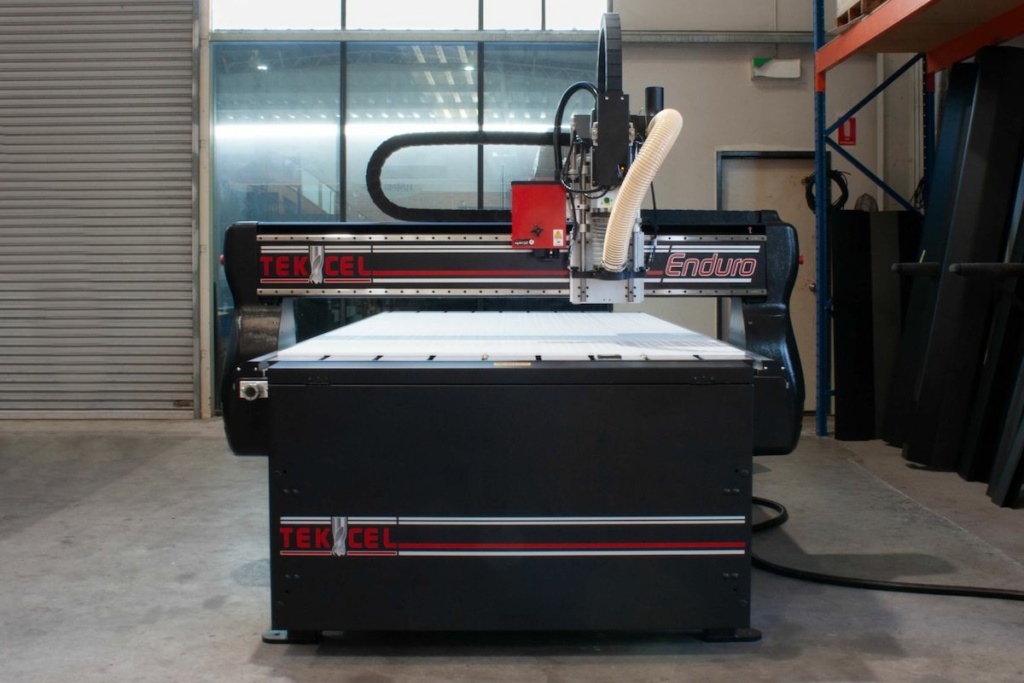Common CNC Router Terms

Understanding CNC terminology.
CNC routers are powerful and dynamic machines used in various industries for cutting, milling and engraving materials.
If you’re new and just starting with CNC machining, continue reading to learn commonly used terms in the industry.
| Term | Definition |
| CNC | Computer Numerical Control |
| CAD | Computer-Aided Design |
| CAM | Computer Aided Manufacturing |
| Toolpath | The user-defined coded route that the cutter follows to machine the workpiece. |
| Post-Processor | A driver that converts toolpaths into a specific code that can be read by a CNC machine. |
| G-Code | The programming language used to instruct CNC machines on how to move. Commands in G-code control the movement, speed and path of the cutting tool. |
| Controller | The computer-based system that controls and monitors the movements of a CNC machine. It is the “brain” of the CNC machine, responsible for executing the programmed cutting or machining operations. |
| Home Position | Machine-designated zero point determined by physical limit switches. (It does not identify actual work origin when processing a workpiece.) |
| Z Axis | Vertical dimension of machine’s coordinate system. |
| Y Axis | Left to right dimension of machine’s coordinate system. |
| X Axis | Forward to back dimension of machine’s coordinate system. |
| Origin | User-designated zero point for the workpiece, from which the CNC router head will perform all its cutting. X, Y and Z axes are set to zero. |
| Ballscrew Drive | A drive system component rotated by the drive motor, providing means for moving the gantry and spindle along an axis. |
| Automatic Tool Changer (ATC) | A system that automatically changes the tools in a CNC machine without any human operator interaction. |
| Spindle | The motorised component of a CNC machine that holds and rotates cutting tools such as drills, end mills, or router bits. |
| Collet | A steel clamping device used to hold onto a cutting tool securely. It fits inside a spindle, and when tightened, provides a precise and tight grip that prevents the cutting tool from moving. |
| Gantry | The bridge-like structure that spans across the machine bed. It supports the spindle and moves up and down the X Axis. |
| Table or Bed | The flat surface that supports sheet material during cutting. |
| Sacrificial Board or Spoil Board | A disposable sheet of material (usually MDF) that attaches to the top of the router table, protecting the router’s tabletop. |
| Vacuum Manifold | The vacuum distribution system, consisting of multiple valves that can be opened or closed to manipulate vacuum channels in the machine bed. |
| Spindle Speed | The rotational speed of the cutting tool, measured in RPM (Rotations per Minute). |
| Plunge Rate | The speed at which the Z Axis lowers into the material. |
| Feed Rate | The speed at which the cutting tool moves through the material on the XY Axes. |
| Step Over | The distance the cutting tool moves over between passes. This affects the surface finish and machining time. |
| Nesting | The process of arranging parts to be cut from a single piece of material to minimize waste. |
If you have any questions, feel free to contact us on (08) 9248 6344.
Best Regards,
The Tommotek Team